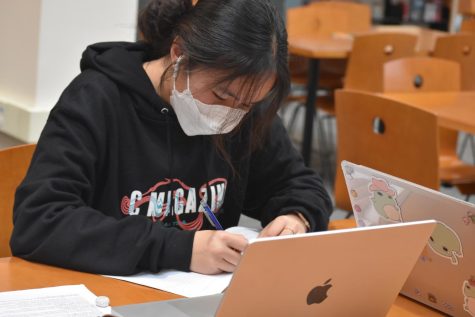District homework survey sees mixed results
March 9, 2022
A survey conducted by Palo Alto Unified School District at all of its school sites finds that students’ homework loads meet the amount expected by the district following the school board’s updated regulations.
Students at the middle and high school level were asked eight questions, including one about Honors and Advanced Placement courses for high schoolers. The survey asked about students’ homework load as well as new changes prohibiting graded assignments and tests on block days.
PAUSD has multiple policies designed to regulate students’ homework, as outlined in Academic Regulation 6154. Students are expected to have 1.5 hours of schoolwork per night for those with lighter course loads and 3 hours of schoolwork per night for students taking AP/Honors courses. Additionally, graded assignments are prohibited during winter and summer break and on seven-period Mondays.

Some students, such as senior Josh Butler, feel these regulations expect too much out of students.
“It’s ridiculous for there to be two to three hours of required homework — for us to spend several hours at school, only to go home and do more schoolwork is absurd,” Butler said.
Other students disagree with this assessment. Sophomore Sidd Sen said he feels the expected homework load for students is reasonable.
“It’s reasonable for teachers to issue that much work, especially if students work well during class,” Sen said.
The survey concluded that students’ homework load fell below the expected amounts, at least for the average student, according to the survey. Freshmen spend, on average, 97 minutes on homework every night, with sophomores spending 110 minutes, juniors 134 minutes, and seniors 119 minutes.
Sophomore Sonia Raina said her homework load is reasonable, even though she takes difficult classes and participates in multiple extracurricular activities.
“I spend about two to three hours on homework depending on what day it is, mainly in my AP and honors classes,” Raina said. “I do a lot of extracurriculars as well, so I think that’s reasonable.”
Many students take multiple AP and Honors classes, oftentimes more than the two AP classes recommended by Palo Alto High School. According to the survey, 19% of students are taking no AP/Honors classes, 42% are taking one or two, 29% are taking three or four, and 10% are taking five or more.
According to Sharon Ofek, Associate Superintendent of Educational Services, the number of students with such a rigorous course load is very surprising.
“Of the kids who responded from the high school level, we have over 200 kids taking five or more honors and AP courses,” Ofek said. “That’s pretty astonishing.”
Many feel significant pressure from parents to take a heavy course load and to fit in with the academic culture at Paly. Senior Austin Xiang said he feels that students take difficult courses to feel academically equal with their classmates.
“The Paly academic community is really cutthroat,” Xiang said. “You see those around you challenging themselves, taking as difficult courses as they can, and you feel like you need to do the same as well in order to be ‘on par’ with your peers.”
Raina feels that the rigorous course loads of many students limit the effect of homework policy changes, though she applauds the district for trying to make a difference.
“It’s very important for students to take on what they can handle, but I do think that the district — [with] whatever is in their capability — are doing a good job of helping reduce stress because it’s guaranteed [that] if you’re taking really rigorous classes, you are going to be stressed with homework,” Raina said.
Sen said he believes that it is important for the district not to limit students’ class choices in order to reduce stress.
“I think in an effort to make sure that the average person doesn’t feel stress, they hold back many students who would like to be pushed further,” Sen said. “They stopped allowing people to take eight classes when I feel that’s the student’s choice, and it shouldn’t be in their ability to just take that away.
The survey also assessed new homework policy changes implemented at the beginning of this school year which prohibits teachers from having graded assignments and tests on seven-period Mondays. However, the results of the survey reported 66% of students have had homework due and 34% of students have had tests on these days.
According to PAUSD school board President Ken Dauber, although the results regarding policy compliance were negative, the survey still served the purpose of acquiring data for future improvement.
“It’s disappointing that students are still reporting some level of non-compliance with the aspects around homework being due on seven-period days and other items we’ve talked about,” Dauber said. “The board’s interest is in knowing the level of compliance that we’re seeing and the distance that we still have to go.”
Despite this, the students who have found fewer assignments and tests on Mondays have found it has helped them reduce stress, including Butler.
“I have not had any homework [on weekends] because of the new rule, all of my teachers respect that,” Butler said. “My weekends have been a lot freer lately.”



